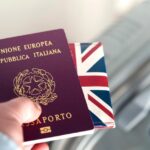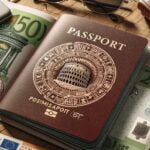What do you need to travel to Italy from the US? Planning a trip to Italy can be an exciting endeavor, but it’s essential to ensure that you have the correct travel documents in order before embarking on your journey. From passport requirements to visa information, there are several important factors to consider when preparing for a trip to Italy from the US.
Italy is a country known for its rich history, beautiful landscapes, delicious cuisine, and vibrant culture. Whether you’re interested in exploring iconic cities like Rome and Florence or relaxing along the stunning Amalfi Coast, Italy offers something for every type of traveler. However, before you can soak in all that Italy has to offer, it’s crucial to understand and fulfill the necessary travel requirements.
In this article, we will delve into the specific passport requirements for US citizens traveling to Italy. Additionally, we will provide detailed information about visa requirements and application processes, discuss the importance of travel insurance, offer packing tips, address health and safety considerations, explain currency and financial planning, and provide a roundup of additional tips and resources for a smooth and hassle-free trip to Italy.
Passport Requirements for US Citizens
Traveling to Italy can be a dream come true for many people, but it’s important to ensure that you have all the necessary travel documents in place before your trip. For US citizens, this means having a valid passport and possibly a visa depending on the length and purpose of your visit. Here’s what you need to know about the specific passport requirements for traveling to Italy from the US:
Passport Requirements for US Citizens Traveling to Italy
- Valid Passport: All US citizens traveling to Italy must have a passport that is valid for at least three months beyond their planned date of departure from the Schengen area.
- Visa Waiver Program: Italy participates in the Visa Waiver Program, which allows US citizens to travel to Italy for tourism or business purposes for stays of up to 90 days without obtaining a visa.
- Visas for Longer Stays: If you plan to stay in Italy for longer than 90 days, for work or study purposes, you will need to obtain a visa before your trip. The type of visa required will depend on your specific circumstances.
It’s important to double-check the passport requirements and visa regulations with the Italian consulate or embassy in the United States well in advance of your trip. Additionally, it’s always a good idea to make copies of your passport and other important travel documents, and keep them separate from the originals while traveling.
Remember that different countries may have different entry requirements, so it’s crucial to be informed and prepared before embarking on your Italian adventure.
Visa Information
When planning a trip to Italy, one of the essential requirements for US citizens to consider is whether a visa is required for entry into the country. Fortunately, US citizens traveling to Italy for tourism or business purposes for stays of 90 days or less do not need a visa.
This is due to the fact that Italy is part of the Schengen Agreement, which allows US citizens to enter member countries for short stays without the need for a visa.
Exceptional Cases
It’s important to note that there are some exceptional cases where a visa may be required even for short stays in Italy. For example, if you plan to study, work, or engage in any other long-term activity in Italy, you will need to apply for an appropriate visa before your trip.
Additionally, if you have previously been denied entry into any Schengen Area country or have had any other immigration issues, it’s advisable to check with the Italian consulate regarding visa requirements.
Application Process
For those who are required to obtain a visa for travel to Italy, it’s essential to start the application process well in advance of your planned trip. The application process typically involves completing an online application form, providing supporting documents such as proof of accommodation and sufficient financial means, scheduling an appointment at the designated Italian consulate, and attending an in-person interview.
It’s crucial to carefully follow all instructions provided by the consulate and ensure that all necessary documents are submitted accurately and on time.
Italy
is crucial for planning a smooth and hassle-free trip. By being well-prepared with the correct travel documents and adhering to the necessary application procedures, US citizens can enjoy their visit without any unnecessary complications related making sure everything is right so that they can lay back and sit back while they enjoy their trip.
Travel Insurance
When choosing a travel insurance policy for a trip to Italy, there are several key factors to consider. One important aspect is coverage for medical emergencies, which includes hospitalization, doctor’s visits, and medications. Additionally, it’s important to ensure that the policy includes coverage for emergency medical evacuation back to the US if necessary.
Another crucial component of travel insurance for Italy is coverage for trip cancellations and interruptions. This can provide reimbursement for non-refundable expenses in the event of unexpected cancellations or delays due to reasons such as illness, severe weather, or other unforeseen events. Additionally, coverage for lost or delayed baggage should also be included in the policy.
In addition to these essential coverage areas, it’s advisable to consider other factors such as 24/7 emergency assistance services and whether pre-existing conditions are covered. By carefully evaluating these aspects when selecting a travel insurance policy for a trip to Italy from the US, travelers can ensure they have comprehensive coverage that suits their specific needs.
| Important Aspects of Travel Insurance | Considerations |
|---|---|
| Medical Coverage | Hospitalization, doctor’s visits, medications |
| Trip Cancellation/Interruption Coverage | Reimbursement for non-refundable expenses due to unexpected cancellations or delays |
| Lost/Delayed Baggage Coverage | Reimbursement for lost or delayed baggage |
| Emergency Assistance Services | 24/7 emergency support during the trip |
Packing Tips
When preparing for a trip to Italy, it is important to ensure that you have all the necessary items packed, including important documents and travel essentials. Here is a checklist of essential items to pack for a trip to Italy:
- Passport: Ensure that your passport is valid for at least six months beyond your intended departure date from Italy. It is also advisable to make photocopies of your passport in case it gets lost or stolen during your travels.
- Visa (if applicable): Check whether you need a visa to enter Italy as a US citizen. Depending on the purpose of your visit and the duration of your stay, you may need to apply for a visa before traveling.
- Travel insurance: Consider purchasing travel insurance to cover any unexpected medical expenses, trip cancellations, or lost luggage during your time in Italy.
- Medication: If you take any prescription medications, be sure to bring an ample supply for the duration of your trip, as well as any necessary documentation from your healthcare provider.
- Travel adapter: Italy uses type F sockets, so be sure to pack a suitable travel adapter if you plan on using electronic devices during your trip.
In addition to these important documents and essentials, remember to pack clothing appropriate for the season and activities you have planned while in Italy. It’s also advisable to carry some local currency, such as euros, and have access to international banking services in case of emergencies.
Ultimately, being prepared with the right documents and essentials will ensure that you can fully enjoy your trip to Italy without any unnecessary stress or complications.
Health and Safety
When traveling to Italy, it is crucial to prioritize your health and safety. US citizens must ensure that they have the necessary vaccinations and take precautions to stay healthy throughout their trip. It is important to consult with a healthcare provider or travel medicine specialist to determine what vaccinations are required prior to traveling to Italy. Common vaccines that are recommended for travelers to Italy include hepatitis A, hepatitis B, and rabies, among others.
In addition to vaccinations, visitors should also take measures to prevent illness while in Italy. This includes practicing good hygiene, such as washing hands regularly and avoiding contact with sick individuals. Travelers should also be cautious when consuming food and water, opting for bottled water and well-cooked meals. It is also advisable to carry a basic medical kit containing essential items such as over-the-counter medications, bandages, and insect repellent.
Furthermore, travelers should familiarize themselves with the healthcare system in Italy in case medical assistance is needed during their trip. While emergency medical services are available throughout the country, it is important to have comprehensive travel insurance that covers any potential medical expenses. In the event of a medical emergency, having access to proper healthcare facilities can make a significant difference in receiving timely and adequate treatment.
| Recommended Vaccinations | Preventive Measures |
|---|---|
| Hepatitis A | Wash hands regularly |
| Hepatitis B | Avoid contact with sick individuals |
| Rabies | Consume bottled water and well-cooked meals |
Currency and Financial Planning
When traveling to Italy from the US, it’s important to consider the currency used in Italy and to make proper financial preparations for your trip. Understanding the currency and how to manage your finances while abroad can help ensure a smooth and enjoyable travel experience.
Currency Used in Italy
The official currency of Italy is the Euro (€). As such, when traveling to Italy from the US, it’s essential to exchange your US dollars for Euros before or upon arrival in the country. It’s advisable to exchange money at banks or authorized currency exchange offices to ensure that you receive a fair exchange rate.
Managing Finances While Traveling Abroad
Before departing for Italy, it’s crucial to inform your bank of your travel plans. This can help prevent any issues with using your credit or debit cards while abroad. Additionally, consider obtaining a small amount of cash in Euros for immediate expenses upon arrival, such as transportation from the airport or tips for luggage handlers.
Furthermore, it’s important to be mindful of foreign transaction fees that may apply when using credit or debit cards in Italy. To minimize these fees, consider opening a checking account with a bank that offers no foreign transaction fees or obtaining a travel credit card specifically designed for use abroad.
By understanding the currency used in Italy and implementing smart financial planning strategies, you can ensure that managing your finances while traveling to this beautiful country is stress-free and convenient.
Additional Tips and Resources
In conclusion, traveling to Italy from the US requires careful planning and consideration of various important factors. Ensuring that you have the correct travel documents, such as a valid passport, is essential for a smooth and hassle-free trip. US citizens must be aware of specific passport requirements for traveling to Italy, including validity period and any additional visas that may be required.
Additionally, it’s crucial to consider travel insurance when planning a trip to Italy. Having adequate coverage can provide peace of mind and financial protection in case of unexpected events during your travels. It’s also important to pack essential items for your trip, including important documents like your passport and any necessary medications.
Staying healthy and safe while in Italy is another important aspect to consider. Researching any necessary vaccinations and understanding health and safety tips can help ensure a pleasant travel experience.
Finally, being prepared with knowledge about the local currency, financial planning, and other useful tips will contribute to a successful trip to Italy. By taking these factors into account and properly preparing for your journey, you can look forward to an enjoyable and memorable experience exploring all that Italy has to offer.
Frequently Asked Questions
What Is Required for a US Citizen to Visit Italy?
A US citizen visiting Italy needs a valid passport that remains valid for the duration of their stay. As of 2021, there is no need for a visa for stays shorter than 90 days within a 180-day period.
Does Italy Require 6 Months on Passport?
Italy does not require US citizens to have 6 months validity on their passport upon entry. However, it is always advisable to have a passport with sufficient validity past the planned date of departure from Italy in case of any unexpected delays.
What Documents Do I Need to Travel to Italy?
For travel to Italy, US citizens need a valid passport and may not need a visa for short stays. Additionally, it’s important to have travel insurance, proof of accommodation, and sufficient funds to cover the trip. It’s also a good idea to check specific requirements with the Italian embassy or consulate before traveling.

I’m a passionate traveler, writer, and Italophile. My fascination with Italy’s history, art, and culture has led me on countless adventures across the Italian landscape. Through “I Live Italy,” I share my love for this extraordinary country and aims to inspire others to explore its boundless beauty.





